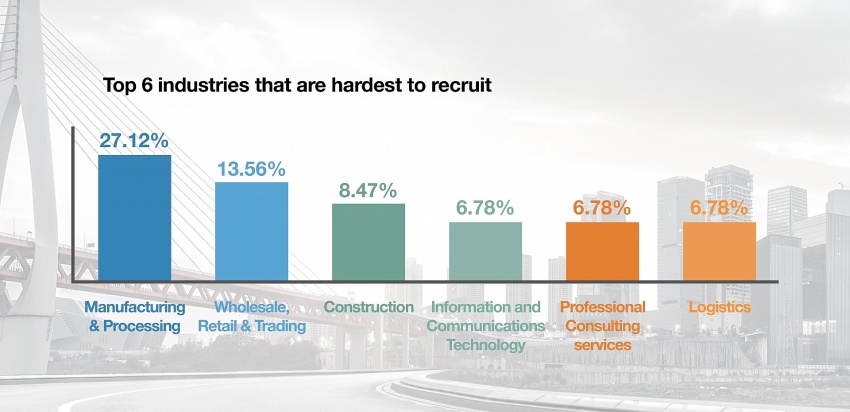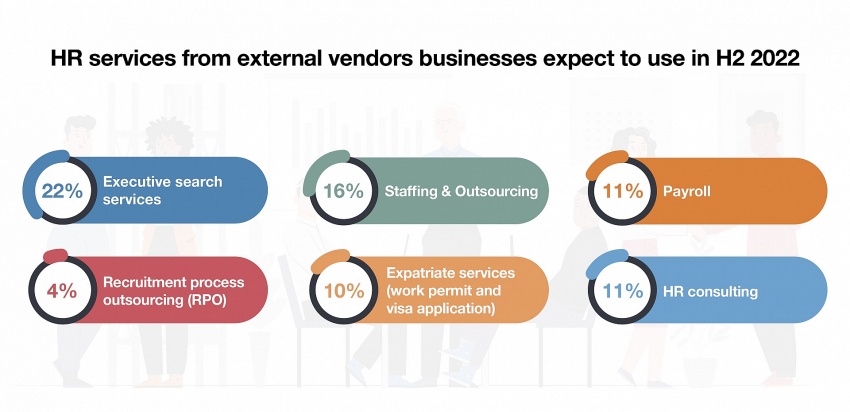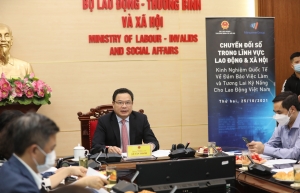Solving talent shortages amid fierce human capital landscape
In a recent seminar on developing a stable labour supply chain after the pandemic, the Ministry of Labour, Invalids and Social Affairs (MoLISA) reported that labour shortages are severe in diverse industries as the country is on its way to recovery.
In the first quarter only, there was a local labour shortage of about 120,000 workers, nearly 10 per cent of the recruitment demand. Blue-collar workers made up for most of the labour shortage, focusing mainly on the manufacturing sector such as textile and garments, electronic component assembling, and wood processing.
Labour scarcity seriously challenges Vietnamese industries
 |
| Andree Mangels, general manager of ManpowerGroup Vietnam |
The Vietnam Employment Outlook Survey Q3 & Q4 2022 recently released by ManpowerGroup Vietnam reveals recruitment challenges faced by businesses.
Up to 57 per cent of the surveyed employers have difficulty in hiring workers satisfying their requirements. Among these, the manufacturing and processing industry finds it hardest to recruit, as reported by 27 per cent of the surveyed manufacturers.
 |
| Top industries are the hardest to recruit for |
There are various factors leading to recruitment challenges, including the shortage of skills.
Many local and FIE employers claim that it is hard to find workers with the desired skill sets. A survey by ManpowerGroup Vietnam and the Institute of Labour, Science, and Social Affairs (under MoLISA) on 200 manufacturing FIEs has revealed that besides technical skills, workers often struggle to meet the requirements of other soft skills like time management, teamwork, and foreign languages.
Attracting and retaining workers in the long run
In dealing with the labour shortage for production, apart from relying on their own recruitment capability, businesses in Vietnam also come to professional HR service providers like ManpowerGroup Vietnam in search of help.
Among the wide range of HR solutions, staffing and outsourcing services are some of the most preferred options for many manufacturing, processing, and logistics companies, particularly if they wish to supplement their current labour force during peak seasons.
According to ManpowerGroup Vietnam's Employment Outlook Survey for the second half of 2022, nearly one in five among over 100 employers joining our nationwide survey opted for staffing and outsourcing services.
 |
| Top HR services employers planning to use in H2 2022 |
Businesses need to flexibly meet their seasonal demand for workers during the activity booms. Many of our clients share that ManpowerGroup Vietnam’s consultants work as an extended arm of their HR departments and reduce the pressure of finding and hiring the needed workers while optimising fixed costs.
In 2022, ManpowerGroup Vietnam's business partners need more than 10,000 seasonal workers. To provide timely support for our clients, we have over 60 full-time recruitment consultants and associates in staffing and outsourcing services.
Apart from our head and branch offices in Hanoi and Ho Chi Minh city, our local recruitment hubs are located in key cities and provinces from Hanoi, Haiphong, Bac Ninh, Ha Nam to Vinh Phuc, Hung Yen, Binh Duong and Dong Nai.
In addition to wide talent networks, ManpowerGroup Vietnam maintains close relationships with universities and colleges and vocational schools nationwide to connect students with great job opportunities while enabling enterprises to approach young talents.
In recent years, we organised annual internship programmes that help third and final-year students spend their three-month summer break working in different functions at the manufacturing sites of our clients. The programmes have received much positive feedback from the students as it helps them to gain practical working skills and, eventually, land their dream jobs after graduation.
People-first strategy
Good talent strategies alone are not enough to make people stay.
The pandemic has made people rethink the definition of work, and what they really need. Income is no longer their top priority. Instead, workers are concerned more about health and wellbeing, working environment, development opportunities, and so on.
Now, workers want to have flexible jobs that allow them to take care of their families and have a work-life balance. They expect a good working environment where safety and hygiene factors are a must. They want to feel motivated and passionate about their work. They look forward to learning and training activities to improve skills and move up the career ladder.
They want their contributions to be recognised by managers. Our recent report, The Great Realisation by ManpowerGroup, has shed light on this fact with insightful findings. About 81 per cent of global employees expect training programmes from their employers to help skills up to date.
Meanwhile, nearly 25 per cent of workers are looking for employers who provide benefits such as caregiving leave. In other words, employers who fail to understand those needs and turn them into suitable strategies may need to prepare to lose talent to companies that will.
At ManpowerGroup, we believe that a holistic approach that takes both business goals and employees’ benefits into account will enable companies to win in the competitive labour market. It is not only about giving people jobs but about making them stay.
What the stars mean:
★ Poor ★ ★ Promising ★★★ Good ★★★★ Very good ★★★★★ Exceptional
Themes: Human Capital 4.0
Related Contents
Latest News
More News
- IP alterations shape asset strategies for local investors (January 22, 2026 | 10:00)
- 14th National Party Congress: Vietnam - positive factor for peace, sustainable development (January 22, 2026 | 09:46)
- Japanese legislator confident in CPV's role in advancing Vietnam’s growth (January 22, 2026 | 09:30)
- 14th National Party Congress: France-based scholar singles out institutional reform as key breakthrough (January 21, 2026 | 09:59)
- 14th National Party Congress: Promoting OV's role in driving sustainable development (January 20, 2026 | 09:31)
- 14th National Party Congress affirms Party’s leadership role, Vietnam’s right to self-determined development (January 20, 2026 | 09:27)
- Direction ahead for low-carbon development finance in Vietnam (January 14, 2026 | 09:58)
- Vietnam opens arms wide to talent with high-tech nous (December 23, 2025 | 09:00)
- Why global standards matter in digital world (December 18, 2025 | 15:42)
- Opportunities reshaped by disciplined capital aspects (December 08, 2025 | 10:05)





 Tag:
Tag:




















 Mobile Version
Mobile Version